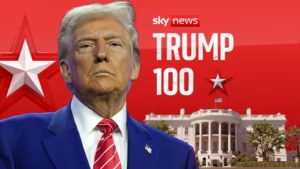Before President Barack Obama took office in 2009, Benjamin Netanyahu unexpectedly called Israeli diplomat Alon Pinkas to request a lesson in a foreign language – the language of Democrats. Netanyahu, who was about to become the Prime Minister of Israel, said, “I only speak Republican and so I need a mediator. He added, “Netanyahu always sees himself as a pedigree neocon belonging to the right-wing of the Republican Party.”
Now, Netanyahu is once again in conversation with his preferred party, and the change is stark. Unlike former President Joseph R. Biden Jr. who had imposed constraints on Netanyahu’s military campaign in Gaza, the Trump administration has made no such demand. While Biden criticized Netanyahu’s attempt to overhaul Israel’s courts, Trump has launched similar attacks against American judges.
Natan Sachs, a director of the Center for Middle East Policy and a senior fellow at the Brookings Institution, noted, “They are unshackled. Many concerns about humanitarian aid and limiting civilian casualties voiced by the previous White House are no longer present.” Looming over this week’s meeting is a point of tension: Mr. Trump’s sweeping tariffs, which apply to Israel as well. Netanyahu’s office indicated that the two men are going to discuss the tariff issue, the war in Gaza, Israel-Turkey relations, Iran, and the International Criminal Court.
Netanyahu stated, “I am the first international leader who will meet with President Trump on the issue, which is important to the Israeli economy. Many other leaders want this regarding their economies. I think this reflects the special personal link, as well as the special ties between the US and Israel.”
While all recent American administrations have been allied with Israel to varying degrees, Biden and Netanyahu had a long and complicated relationship. Biden called Netanyahu a “close, personal friend of over 33 years,” and Netanyahu named Biden an “Irish American Zionist.”
Biden also grew frustrated with Netanyahu’s conduct in office, criticizing his overhaul of Israel’s judiciary, and using profanities about how Israel carried out the war in Gaza following the Oct. 7 terrorist attacks by Hamas.
Quoting Biden after an airstrike in Iran, “You know the international perception of Israel is increasingly that they are a rogue state, a rogue actor.” In contrast, when Israel consulted the White House about aerial attacks across the Gaza Strip, the Trump administration responded with “Give ’em hell.”
The Israeli airstrikes ended a temporary cease-fire with Hamas that began in January, raising the prospect of the return to an all-out war. More than 400 people, including children, were killed in the first hours of the strikes, according to Gaza’s health ministry.
Netanyahu and Trump have also found common cause in their criticism of their countries’ judges. Trump has lashed out against judges who have blocked some of his administration’s actions. Netanyahu commented, “In America and Israel, when a right-wing leader wins an election, the left-wing deep state weaponizes the justice system to thwart the people’s will. They won’t win in either place! We stand strong together.”
Elliott Abrams, a senior fellow for Middle Eastern studies at the Council on Foreign Relations, agreed, “The vice president, the secretary of state, secretary of defense, national security adviser, they’re all viewed as very pro-Israel. The previous administration was viewed as sympathetic but leaning towards restraining Israel.”
In Trump’s first term, Netanyahu angered him by congratulating his successor, Biden, after the presidential election in 2020. In Netanyahu’s view, the first Trump presidency was a boon for Israel. The American president moved the United States’ embassy to Jerusalem and paid little attention to Palestinians, while supporting Israel’s claims over Palestinian territories in the West Bank.
Then, after taking office, Trump proposed that the United States should seize control of Gaza, and permanently displace the entire Palestinian population of the devastated sandside enclave, an idea viewed as one of the most brazen made by any American leader about the region. Although Trump has since distanced himself from this proposal, which he floated during a meeting with Netanyahu, he received praise from him.
While many condemned Trump’s suggestion as immoral and illegal, polls showed it to be widely supported by right-wing Israelis, who make up Netanyahu’s base, and Trump remains popular in Israel.
Netanyahu’s alignment with Trump as Israel and Hamas negotiate hostages and a cease-fire gives him unique power in the country. Israel fears Trump more and thinks he’s unpredictable.
Steven Witkoff, Trump’s Middle East envoy, has been in talks about a new cease-fire agreement. Netanyahu has chosen Ron Dermer, a former Republican activist with close ties to Trump, to join cease-fire talks. As the conflict resumes with Trump’s blessing, the Trump administration will also assume ownership of the war, according to Ned Lazarus, an associate professor of International Affairs at George Washington University’s Elliott School.
Source: https://www.nytimes.com/2025/04/07/us/politics/netanyahu-trump-israel-gaza.html






